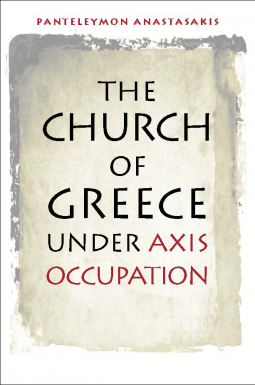
The Church of Greece under Axis Occupation
by Panteleymon Anastasakis
This title was previously available on NetGalley and is now archived.
Buy on Amazon
Buy on BN.com
Buy on Bookshop.org
*This page contains affiliate links, so we may earn a small commission when you make a purchase through links on our site at no additional cost to you.
Send NetGalley books directly to your Kindle or Kindle app
1
To read on a Kindle or Kindle app, please add kindle@netgalley.com as an approved email address to receive files in your Amazon account. Click here for step-by-step instructions.
2
Also find your Kindle email address within your Amazon account, and enter it here.
Pub Date Dec 15 2014 | Archive Date Dec 15 2014
Description
Axis forces (Germany, Italy, and Bulgaria) occupied Greece from 1941 to 1944. The unimaginable hardships caused by foreign occupation were compounded by the flight of the government days before enemy forces reached Athens. This national crisis forced the Church of Greece, an institution accustomed to playing a central political and social role during times of crisis, to fill the political vacuum. Led by Archbishop Damaskinos of Athens, the clergy sought to maintain the cultural, spiritual, and territorial integrity of the nation during this harrowing period. Circumstances forced the clergy to create a working relationship with the major political actors, including the Axis authorities, their Greek allies, and the growing armed resistance movements, especially the communist-led National Liberation Front. In so doing the church straddled a fine line between collaboration and resistance individual clerics, for instance, negotiated with Axis authorities to gain small concessions, while simultaneously resisting policies deemed detrimental to the nation.
Drawing on official archives of the Greek Ministry of Foreign Affairs, the British Foreign Office, the U.S. State Department, and the Greek Holy Synod alongside an impressive breadth of published literature, this book provides a refreshingly nuanced account of the Greek clergy's complex response to the Axis occupation of Greece during World War II. The author's comprehensive portrait of the reaction of Damaskinos and his colleagues, including tensions and divisions within the clergy, provides a uniquely balanced exploration of the critical role they played during the occupation. It helps readers understand how and why traditional institutions such as the Church played a central social and political role in moments of social upheaval and distress. Indeed, as this book convincingly shows, the Church was the only institution capable of holding Greek society together during World War II.
While The Church of Greece under Axis Occupation elucidates the significant differences between the Greek case and those of other territories in Axis-occupied Europe, it also offers fresh insight into the similarities. Greek clerics dealt with many of the same challenges clerics faced in other parts of Hitler's empire, including exceptionally brutal reprisal policies, deprivation and hunger, and the complete collapse of the social and political order caused by years of enemy occupation. By examining these challenges, this illuminating new book is an important contribution not only to Greek historiography but also to the broader literatures on the Holocaust, collaboration and resistance during World War II, and church state relations during times of crisis.
Drawing on official archives of the Greek Ministry of Foreign Affairs, the British Foreign Office, the U.S. State Department, and the Greek Holy Synod alongside an impressive breadth of published literature, this book provides a refreshingly nuanced account of the Greek clergy's complex response to the Axis occupation of Greece during World War II. The author's comprehensive portrait of the reaction of Damaskinos and his colleagues, including tensions and divisions within the clergy, provides a uniquely balanced exploration of the critical role they played during the occupation. It helps readers understand how and why traditional institutions such as the Church played a central social and political role in moments of social upheaval and distress. Indeed, as this book convincingly shows, the Church was the only institution capable of holding Greek society together during World War II.
While The Church of Greece under Axis Occupation elucidates the significant differences between the Greek case and those of other territories in Axis-occupied Europe, it also offers fresh insight into the similarities. Greek clerics dealt with many of the same challenges clerics faced in other parts of Hitler's empire, including exceptionally brutal reprisal policies, deprivation and hunger, and the complete collapse of the social and political order caused by years of enemy occupation. By examining these challenges, this illuminating new book is an important contribution not only to Greek historiography but also to the broader literatures on the Holocaust, collaboration and resistance during World War II, and church state relations during times of crisis.
Advance Praise
"This work has great significance not only for the history of Greece in the first half of the twentieth century but also for the topic of Nazi occupied Europe. In the broader field of modern European history and the Holocaust the work offers a number of fresh insights. The analysis of the effects of the Bulgarian occupation of Macedonia decisively recasts the established view of the Bulgarian government as a committed resister of the Holocaust. In addition, this study adds much needed new ground to the question of the role of the churches in occupied Europe. In analyzing the role of the Greek Church, this work does a masterful job of not treating the church as a monolithic institution. The tensions and divisions between upper and lower clergy in their responses to the stresses of occupation come through clearly. Likewise, the analysis demonstrates a keen awareness of regional variation in the responses of different clerics caused by the tri-partite occupation."--Jonathan Grant, Florida State University
Available Editions
| EDITION | Hardcover |
| ISBN | 9780823261994 |
| PRICE | $55.00 (USD) |




